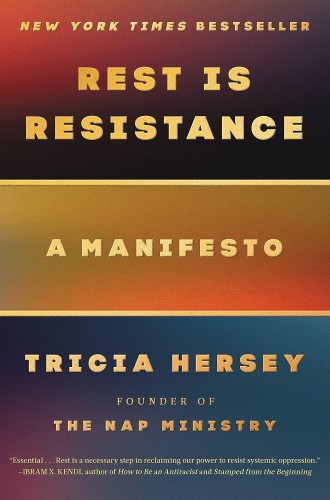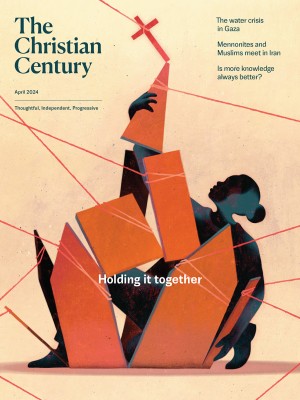Naps against capitalism
How can rest be a political act? Poet-theologian Tricia Hersey returns to this question often.
When you hear the word manifesto, it’s unlikely that daydreaming, napping, and resting are the first things that come to your mind. But that association is what Rest Is Resistance aims to create. Poet-theologian Tricia Hersey weaves together personal narrative, lyrical theology, and political theory to leverage the political power of rest against “grind culture,” which becomes shorthand for systems and ideologies—in particular, White supremacy and capitalism—that jeopardize human flourishing.
Rest Is Resistance repeatedly returns to its central premise: resting, opting out, slowing down, napping, and daydreaming can function as political practices through which individuals and communities resist the systems and social relations that degrade human beings and shortchange them of their divinity: “We must spiritually disconnect from the shenanigans of grind culture while physically still living in it. A metaphysical and spiritual refusal must be developed deep within. Capitalism may not fall in our lifetimes, and it is not redeemable, so the work is to begin to reclaim your body and your time.”
Read our latest issue or browse back issues.
At times, Hersey sounds like an intersectional Bartleby the scrivener, with an “I’d prefer not to” ethos repackaged for an anti-capitalist movement that eschews class reductionism. She does not pull punches as she attends to the ways capitalism and grind culture enable and are enabled by social maladies such as ableism, racism, and sexism.
Hersey’s tone rests somewhere between euphoric wonderment and prophetic derision. She marvels at the body and the healing power of rest while lambasting the exploitative power of racialized capitalism. “Rest is a healing portal to our deepest selves,” she writes. It is “a meticulous love practice” that helps us to “unravel” the mythology of grind culture. “Rest is radical because it disrupts the lie that we are not doing enough.”
Unraveling, dismantling, decolonizing, and deprogramming: these are the political actions that Hersey affixes to the transformative work of rest. She pitches a “Rest Is Resistance movement” as a conduit of liberation and consciousness-shifting praxis, a spiritual and political movement “rooted in care and justice,” “deprogramming from our brainwashing” at the hands of a voracious and violent economic system. Rest can disrupt unjust systems; to rest is to “get behind the curtain to see everything that has been told to us about rest, labor, sleep, leisure, and care has been a lie.” Hersey formulates this strand of her project with this pithy wordplay: “By putting people to sleep we are waking them up.”
How does one rest politically? Hersey returns to this question throughout the book, often emphasizing what rest is not. (For instance, it is not a simple recharge so that people can be more efficiently exploited by unjust systems.) She offers practical starting points: listen, slow down, daydream, detox from social media, pray, nap, take a bath, play music, take a walk, laugh. At the same time, she makes a point of rejecting didactic guidelines. She pitches the book as a “prayer” and a “field guide,” a resource that might spur readers to “finally wake up to the truth of what a machine-level pace of labor has done to our physical bodies, our self-esteem, and our Spirits.”
Rest Is Resistance stands (or lies down) in a long lineage of theological, philosophical, and artistic works that affirm the power of rest—from Whitman’s praise of loafing to Heidegger’s commitment to boredom, from Bonnie Honig’s A Feminist Theory of Refusal to Jonathan Crary’s 24/7: Late Capitalism and the Ends of Sleep. If you are weary, if you share with Hersey the sense that “the Earth is also in a state of extreme exhaustion,” if you suspect that our always-on grind culture is to blame for our collective sapping, this book is for you.





